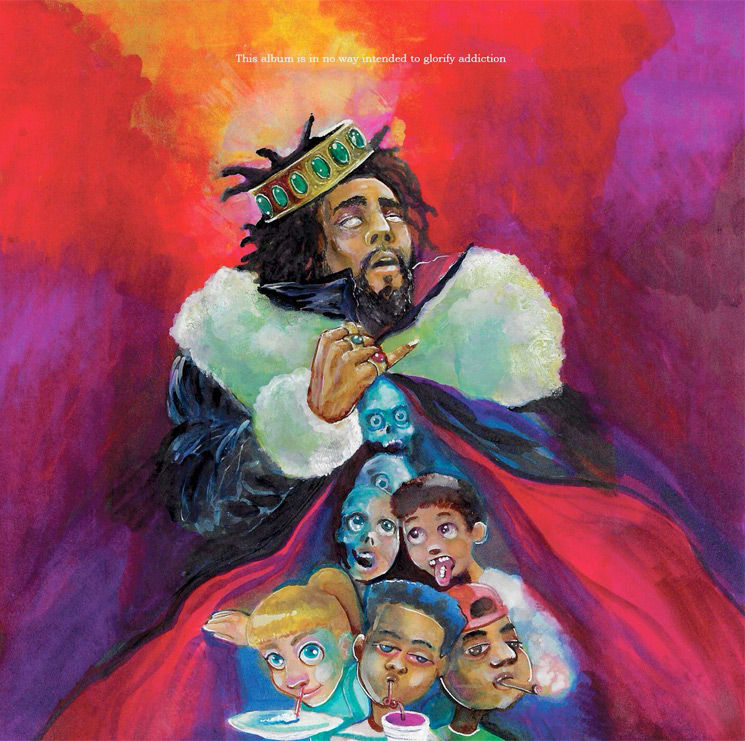With the release of 2014 Forest Hills Drive two years ago, J. Cole let his guard down to allow fans into some of the most personal experiences of his life — ones that took listeners back to his childhood home, and the injustices he's faced in the past. On his latest record, J. Cole continues to be a beacon of social issues, allowing KOD to be a vessel that addresses different states of addiction, both direct and indirect, and its effects on society.
Breaking down the acronym into three different meanings (Kids On Drugs, King Overdosed, Kill Our Demons), KOD speaks to society's (and Cole's peers) obsession with drugs, money and fame, but also carrying battles against depression and dependency, and finally, simply existing as a black person in America.
Though it's no surprise that Cole's consciousness leads the album, his unabashed statements regarding the direction of rap music and its current megastars are gutsy. In the same vain as "False Prophets," which casually takes aim at the likes of Kanye West, Cole uses "1985" to speak to the young colourful generation of rappers who are more concerned with their image than their future. Taking on the role of a prophet himself, he raps, "One day, them kids that's listening gon' grow up / And get too old for that shit that made you blow up."
That sense of consciousness carries the 12-track album full circle. While "Brackets" and "ATM" dissect financial freedoms, songs like "Photograph" (social media obsession) and "Friends" (drug addiction) speak to society's dependence on self-medicating.
For what its worth, the melancholy KOD represents the internal tug-of-war of keeping up appearances while breaking down inside, which is easily represented by the dichotomy of "Kevin's Hart" and "Once An Addict." As "Kevin's Hart" speaks to comedian Kevin Hart's experience with sex addiction and monogamy, J. Cole reveals his inner child on "Once An Addict" flashing back to his mom's downward spiral into depression and sense of abandonment.
Though KOD challenges very real issues in a concise and direct manner, putting them on the table to speak about is only the first step in truly addressing them. J. Cole knows his value to the rap game, but his role as a soothsayer is still to be determined.
(Dreamville/Roc Nation)Breaking down the acronym into three different meanings (Kids On Drugs, King Overdosed, Kill Our Demons), KOD speaks to society's (and Cole's peers) obsession with drugs, money and fame, but also carrying battles against depression and dependency, and finally, simply existing as a black person in America.
Though it's no surprise that Cole's consciousness leads the album, his unabashed statements regarding the direction of rap music and its current megastars are gutsy. In the same vain as "False Prophets," which casually takes aim at the likes of Kanye West, Cole uses "1985" to speak to the young colourful generation of rappers who are more concerned with their image than their future. Taking on the role of a prophet himself, he raps, "One day, them kids that's listening gon' grow up / And get too old for that shit that made you blow up."
That sense of consciousness carries the 12-track album full circle. While "Brackets" and "ATM" dissect financial freedoms, songs like "Photograph" (social media obsession) and "Friends" (drug addiction) speak to society's dependence on self-medicating.
For what its worth, the melancholy KOD represents the internal tug-of-war of keeping up appearances while breaking down inside, which is easily represented by the dichotomy of "Kevin's Hart" and "Once An Addict." As "Kevin's Hart" speaks to comedian Kevin Hart's experience with sex addiction and monogamy, J. Cole reveals his inner child on "Once An Addict" flashing back to his mom's downward spiral into depression and sense of abandonment.
Though KOD challenges very real issues in a concise and direct manner, putting them on the table to speak about is only the first step in truly addressing them. J. Cole knows his value to the rap game, but his role as a soothsayer is still to be determined.
